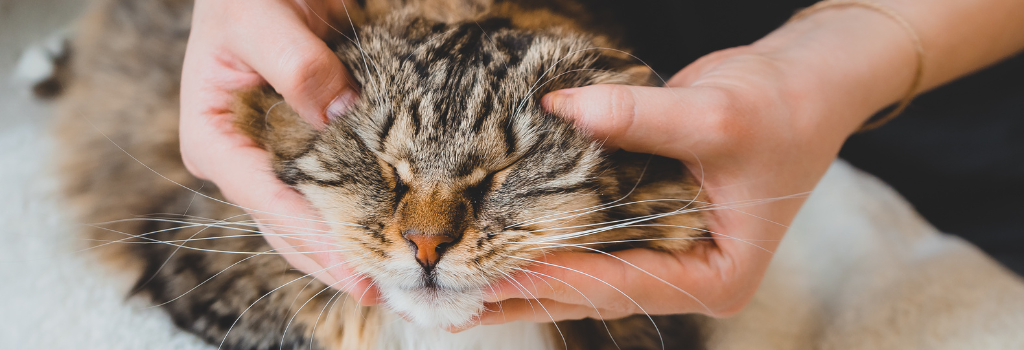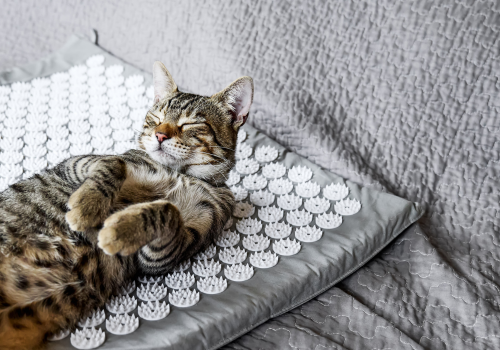When it comes to the health and well-being of your cat, a good veterinarian will explore all options for care. Sometimes this includes integrative medicine, which combines holistic and conventional treatments to achieve the best outcome for your cat. Integrative medicine can be used to treat chronic disease, injuries, and pain, with various combinations of care ranging from acupuncture to medicines. At Duxbury Animal Hospital, we work extremely hard to bring you factual information you can trust. We’ve taken the most frequently asked questions about cat integrative medicine and answered them as thoroughly and accurately as possible to ensure you have the facts.
If you’re looking for a highly trained veterinarian in Duxbury, MA, we’d love to see your cat to discuss an integrative medicine approach, so please call us at (781) 737-7820.
What is integrative medicine, and how can it be helpful to my cat?
Integrative medicine is the combination of multiple treatment modalities that, when combined, are more effective than using an individual therapy alone. It embraces the integration of Chinese and holistic alternative therapies along with traditional Western medical practices, such as acupuncture and food therapy with emergency medicine and diagnostic tools. Combining conventional treatments with additional holistic therapies has a proven scientific basis of effectiveness and could benefit your cat by improving their well-being and outcome of disease.

What is the difference between holistic and integrative medical approaches to cat care?
A holistic approach to medical care is based on alternative remedies, such as herbal medicines, tinctures, and other options that wouldn't necessarily be considered pharmaceutical. Integrative care combines a little bit of the holistic side with Western medicine for a better treatment outcome. As described by the American Holistic Veterinary Medical Association, holistic medicine focuses on the mind, body, and spirit of the animal with the goal of optimal health and eliminating the root cause of disease. Integrative medicine, as described by the Merck Veterinary Manual, is the practice of alternative therapies plus conventional care to provide effective, non-surgical care for pets.
What are the different types of integrative medicine?
While integrative medicine can mean a lot of different things and various combinations of care, there are several that are consistently used to improve the quality of life and prognosis for cats.
Types of cat integrative medicine include:
- Acupuncture
- Herbal medications
- Nutraceuticals
- Aromatherapy
- Tui na, or therapeutic massage
- Food therapy
- Spinal manipulation, similar to chiropractic care for humans
- Shockwave therapy
- Rehabilitation therapy
- Loop therapy to stimulate the body’s natural anti-inflammatory process
- Homeopathy treatments
- Ozone therapy
Leveraging any of these modalities along with the best Western approaches is what most veterinarians refer to as integrative veterinary care.
How does integrative medicine impact the health and well-being of my cat?
Integrative medicine is helpful in controlling illness, injury, or pain and typically allows a cat to reduce the amount of pain medication needed. It also offers a different approach if your cat is having a negative reaction—or no reaction at all—to standard medications used for their particular illness or injury.
How old does my cat need to be to start integrative medicine?
Integrative medicine can be started at any age.
What are some cat illnesses that respond well to an integrative medicine approach?
Common illnesses that respond well to integrative medicine are kidney disease, skin issues, gastrointestinal problems, cancers, and cat behavioral issues. However, it is most often used for chronic bone, joint, and muscle problems affecting mobility.
Integrative medicine is effective in treating chronic pain such as:
- Arthritis
- Chronic back or hip pain
- Slipped disc causing partial or complete paralysis of the back limbs
- Muscle strains, sprains, and spams
Are there any cat health conditions where an integrative approach would not be recommended?
The only situation in which an integrative approach would be ruled out is if it would be potentially harmful to the cat’s health or well-being. For example, herbal medication or other alternative treatments that could harm a cat’s kidneys wouldn’t be considered an option if the cat has known kidney issues. Leveraging integrative medicine is based entirely on the individual needs of a cat.
What is the benefit of a joint supplement for my cat?
Joint supplements are an excellent option for cats since they tend to slow down quite a bit as arthritis progresses. Joint supplements can help protect cartilage and help keep that cartilage nourished and lubricated. An additional benefit of joint supplements is that they can sometimes help to decrease the amount of pain medication a cat needs.

When would a veterinarian recommend pain medication for my cat?
If your veterinarian determines that your cat is in pain, especially to the degree that it's affecting their daily life, they will likely recommend pain medication. This decision also depends on other conditions, such as underlying health issues like kidney disease or liver problems. Some diseases might prevent your veterinarian from using pain medications, so they would instead opt for an integrative medicine approach to help with pain management. Integrative medicine offers more options for pain than traditional medicines.
What are the benefits and drawbacks of cat integrative medicine?
The primary benefit of integrative medicine is that your cat will experience a better treatment outcome. Combining the best of both approaches allows them to work synergistically for the best results. The downside is that you need a cooperative patient for many of these types of treatments. Some cats are excellent about receiving integrative medicine therapies, while others are not. It’s often the cat that decides themselves which integrative medicine modalities your veterinarian can use and which they cannot.
Why is it important to avoid treating my cat with medications and supplements before consulting my veterinarian?
While cat owners have the best of intentions when it comes to caring for their cats, it’s always best to consult a veterinarian when it comes to any medical care—integrative or traditional. A cat owner could easily administer the wrong dose or give the wrong medication entirely. The outcome is that the issue becomes more difficult to treat, or new issues are created. It’s critical that you consult your veterinarian before giving your cat any type of medical treatment.
If you have further questions about cat integrative medicine, reach out to your veterinarian. If you live in or near Duxbury, MA, we’d love to see your cat to discuss integrative medicine options, so please don’t hesitate to call us at (781) 737-7820 or email us at info@duxburyanimalhospital.com.